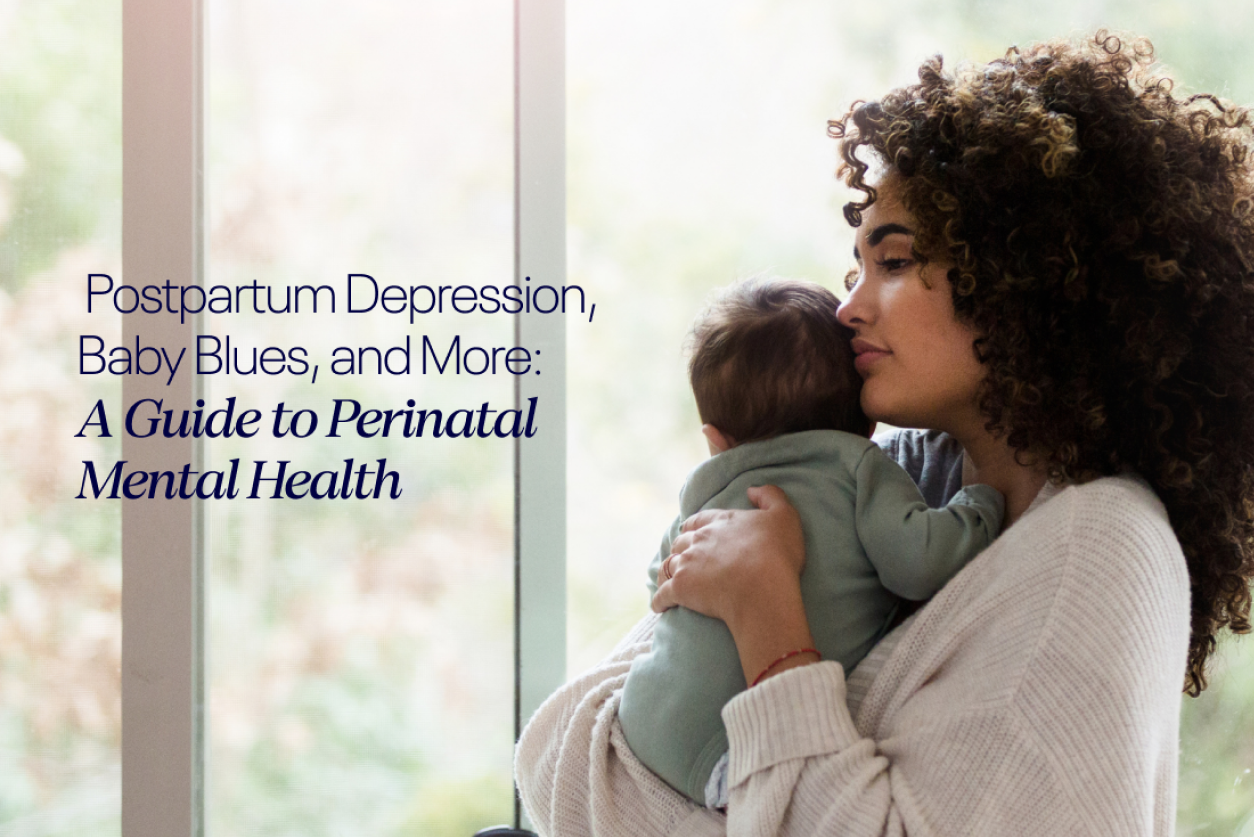In the weeks and months following childbirth, it’s common for new mothers to experience a range of emotions. Many women feel elated one moment, then sad or overwhelmed the next. It might not be what you expected when you were pregnant, but it is normal, and there’s even a name for it: the baby blues.
For some women, these feelings persist and may even worsen over time. This is known as postpartum depression (PPD). PPD can have a significant impact on your life and your relationship with your baby.
May is Mental Health Awareness Month, and at Nanit, we know how difficult those first few months can be as a new mom. In this blog post, we’ll discuss postpartum depression vs. baby blues in more detail and describe some of the lesser-known perinatal mood disorders related to PPD.
We’ve partnered with Dr. Alice Pickering to help support new moms in our community who are struggling with baby blues, PPD, and other perinatal mood disorders. Dr. Pickering is a licensed clinical psychologist who has a passion for serving women and mothers through various life stages, and she specializes in perinatal mood and anxiety disorders. Learn more on Dr. Pickering’s website.
Baby blues: The post-pregnancy hormonal rollercoaster
Most women go through some form of baby blues after giving birth. Many people chalk it up to the significant life changes that come with having a newborn, and while that’s definitely part of the cause (hello, sleep deprivation!), there are also physiological factors at play.
During pregnancy, your hormones are hard at work, sustaining your baby as he or she grows. You can thank those hormones for morning sickness, fatigue, and breast tenderness, but also for those amazing second-trimester highs when you feel optimistic, capable, and dang, your hair looks fantastic, too!
Once you give birth, your levels of estrogen and progesterone plummet, while prolactin and oxytocin surge. The result? Mood swings like whoa.
Baby blues typically start about three days post-birth and last for about two weeks. Signs of baby blues include:
- Feeling sad, anxious, or irritable
- Mood swings
- Crying for no reason
- Anxiety
- Appetite changes
- Feeling overwhelmed or hopeless
- Poor concentration
You’re also likely to experience fatigue and insomnia, which are natural when you’re caring for a newborn and recovering from labor and delivery, but you may not be able to sleep even when your baby’s sleeping.
If you are experiencing the baby blues, know that you are not alone. Up to 80 percent of new mothers will experience some symptoms of the baby blues. For most women, these feelings will resolve on their own. Talk to your partner, friends, and family about what you’re feeling and ask for support when you need it.
Perinatal mood and anxiety disorders (PMADs)
While most people are familiar with postpartum depression, there are a number of perinatal mental health conditions that are related to PPD. They can occur anytime during pregnancy or up to 12 months afterward, which is why the term “perinatal” is often used instead of postpartum.
Causes of perinatal mood disorders
There is no single cause of perinatal mood and anxiety disorders. Rather, they are thought to be the result of a combination of physical, psychological, and social factors. Common causes include:
- A history of depression or anxiety
- A lack of support from family and friends
- Stressful life events during pregnancy or after childbirth
- Hormonal changes
- Sleep deprivation
Postpartum depression (PPD)
Postpartum depression is the most common perinatal mood disorder, affecting up to 20 percent of new mothers. While the baby blues may be a rollercoaster, postpartum depression can feel like an unending spiral downwards.
You may feel guilty for feeling this way; you see other new mamas who seem to be thriving and connected to their babies, and it’s hard not to wonder why you’re feeling so miserable. It’s important to understand that postpartum depression says nothing about your ability to be a good mother or the love you have for your child. It’s a chemical imbalance, and it’s very treatable.
Signs of postpartum depression include:
- Persistent sadness or anxiety
- Loss of interest in hobbies or activities you used to enjoy
- Trouble sleeping or sleeping too much
- Difficulty bonding with your baby
- Feeling disconnected from your partner or family
- Intense irritability or anger
- Feeling hopeless, worthless, or guilty
- Thoughts of harming yourself or your baby
Postpartum anxiety
Postpartum anxiety disorder is another common perinatal mood disorder. It’s receiving more attention as of late, which is a good thing, as it’s sometimes referred to as an “invisible disorder” because it’s so easily brushed aside as normal new-mom anxiety. But when you’re so anxious that you can’t function, it’s a sign that you may have PPAD.
Common signs of PPAD include:
- Excessive worry or anxiety about your baby’s health or development
- Obsessive thoughts about your baby
- Fear of being a bad mother
- Intrusive and unwanted thoughts
- A general sense of dread or a feeling of certainty that something bad will happen
- Physical symptoms such as racing heart, nausea, or difficulty breathing
Postpartum OCD
Postpartum OCD is sometimes seen as a form of postpartum anxiety, but its symptoms can be even more distressing for new moms. If you have a history of OCD, you may find that motherhood brings on new obsessions and compulsions. If you’ve never had OCD before, you may feel fearful and upset about suddenly having intrusive thoughts.
An estimated 3 to 5 percent of new mothers experience OCD. Symptoms include:
- Intrusive and unwanted thoughts or images (obsessions)
- Repetitive behaviors or mental rituals that you feel compelled to do in order to ease your anxiety (compulsions)
- Excessive worry about your baby’s health or development
- Fear of harming your baby or yourself
- Hypervigilance, which may manifest in compulsions to protect your baby from accidents, illness, etc.
Because mothers with postpartum OCD may have thoughts of harming their baby, they may worry that they have postpartum psychosis, but these are two very different disorders.
Dysphoric milk ejection reflex (D-MER)
What if you only feel depressed while breastfeeding? Is that a thing?
Believe it or not, it is a thing, and it’s called dysphoric milk ejection reflex, or D-MER. Many mothers are baffled by this, but like baby blues, it all comes down to hormones. During letdown, when oxytocin and prolactin are released, women with D-MER experience a wave of intense sadness, hopelessness, and anxiety. Sometimes, they also feel physically ill. Then, as quickly as it starts, it goes away, and you feel fine.
Treatments for postpartum depression, anxiety, and other mood disorders
Perinatal mood disorders may make you feel hopeless, but there is help available, and treatments are highly effective. You may be best served by a combination of treatments, or you may only need one.
Treatments include:
- Psychotherapy: Talking to a therapist can help you understand and manage your symptoms. If you don’t have childcare, you can find therapists who do video visits or even ones who will visit your home.
- Antidepressants: Medication can be an effective treatment for postpartum depression, anxiety, OCD, and even severe cases of D-MER. There are a number of medications that are safe to take while breastfeeding.
- Support groups: Connecting with other women who are experiencing similar symptoms can be helpful. Your OB/GYN or your child’s pediatrician may be able to put you in touch with local support groups.
- Intensive treatment: Another option to consider is an intensive outpatient or partial hospitalization program. These programs offer intensive therapy, psychiatry, and group support, and many allow you to bring your baby with you.
- Self-care: Taking care of yourself is essential when you are struggling with a perinatal mood disorder. Be sure to get enough sleep, incorporate movement into your day, and ask for help when you need it—whether it’s having your neighbor bring your older kids to school in the morning or letting your mom make you a week’s worth of freezer meals.
Next steps: Getting the help you need
If you think you might have a perinatal mood disorder, the first step is to talk to your primary care physician or OB/GYN. Your doctor can rule out any medical causes for your symptoms and refer you to a mental health professional if necessary. A trained mental health professional can help you determine whether you have the baby blues, normal new mom anxiety, or a more serious perinatal mood disorder.
For more information, visit:








































